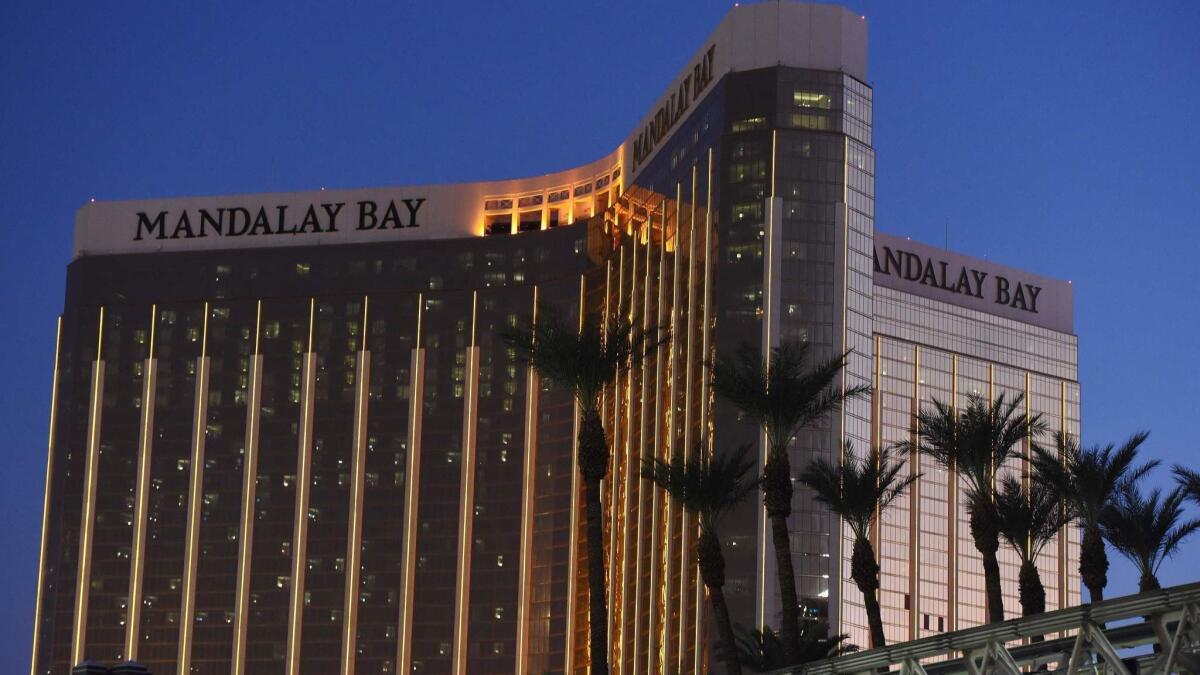MGM sues Las Vegas massacre survivors, claiming a Sept. 11-era terrorism law protects the company from lawsuits

Over the last couple of days, dozens of survivors of last yearâs mass shooting in Las Vegas have started to receive some startling legal notices.
âA lawsuit has been filed against you,â the notices say.
The plaintiff? MGM Resorts International, the casino and hotel company, owner of both the fairgrounds where 58 people were shot to death at a country music festival and the Mandalay Bay Hotel, where the gunman perched himself on the 32nd floor to carry out the Oct. 1 massacre.
In a bold legal maneuver, MGM has sued survivors to claim immunity under a federal law passed in the wake of Sept. 11 that was designed to protect corporations from lawsuits after terrorist attacks. Experts said it was the first time such a lawsuit had ever been filed under the law.
MGM is facing lawsuits from more than 2,500 people after the massacre, which also wounded hundreds.
Survivors, backed by high-profile attorneys, have said the company did not do enough to prevent the attack or limit the extent the harm.
To defend itself, the company is turning to the little-known federal statute called the Safety Act, passed by Congress in 2002 to limit the liability of companies that provide anti-terrorism services.
The idea was that companies might not introduce new security technologies designed to thwart terrorist attacks if the companies would then face expensive â and potentially business-ending â lawsuits when those technologies fail to stop killings.
So policymakers offered companies a deal: With approval for their services by the Department of Homeland Security, they are protected from terrorism-related lawsuits.
âTheyâre basically giving you a get-out-jail-free card for something that hasnât happened yet,â said Bob Karl, a managing partner for Safety Act Consultants, a Milwaukee firm that advises companies seeking Safety Act designations.
Safety Act designations can be an attractive legal protection for event and security companies. In recent years, several National Football League and Major League Baseball stadiums have obtained them.
So did Contemporary Services Corp., also known as CSC, the contractor that provided security for MGM during the music festival.
The company prominently features its Safety Act designation on its website.
MGM is arguing in two federal lawsuits against the survivors â filed in Nevada and California â that the hotel company is, by extension, shielded from the survivorsâ lawsuits, because of the terrorism lawâs protections. The statute also requires that related litigation be pursued in federal courts.
In a statement, MGM Resorts spokeswoman Debra DeShong suggested that its lawsuits would ultimately help the victims.
âThe federal court is an appropriate venue for these cases and provides those affected with the opportunity for a timely resolution,â the statement said. âYears of drawn-out litigation and hearings are not in the best interest of victims, the community and those still healing.â
Though the Safety Act is aimed at terrorist attacks, MGM argued that the federal statute is written broadly enough to include mass shootings where the motive is unknown, such as the Vegas massacre.
MGMâs lawsuits referred to statements made in November by Elaine Duke, who was acting secretary of U.S. Department of Homeland Security: She ânoted the emphasis of âterrorists and other violent criminals ⦠on attacking soft targets,â including ârecent tragedies in Nevada.ââ
Karl, the Safety Act expert, said he believes the lawsuits are the first of their kind and could lead to a highly public throw-down between victims and MGM.
âThat whole thing is going to be a mess,â Karl said. âThe only people who will come out of it well is high-priced attorneys.â
MGM drew backlash Tuesday as news spread of the company suing survivors.
Craig Eiland, an attorney for several victims, said the attempt by MGM to insulate itself from a lawsuit using the Safety Act was âunprecedented.â
âCSC had nothing to do with Mandalay Bay not having security stop Stephen Paddock from unloading luggage with 23 assault rifles, carrying them up to his room and not noticing anything for three to five days,â Eiland said. âThey had nothing to do with allowing him to deadbolt the stairwell â all of these things. And Mandalay Bay is saying because this yellow T-shirt company got this safety designation, everybody is immune?â
Mark Robinson, an Orange County attorney who represents hundreds of potential plaintiffs against MGM, called the companyâs behavior âoutrageous.â
âThey are re-victimizing the victims and their families,â Robinson said, adding that MGM had asked for a list of clients he represented and that after receiving it MGM âresponded by suing them all.â
More to Read
Sign up for Essential California
The most important California stories and recommendations in your inbox every morning.
You may occasionally receive promotional content from the Los Angeles Times.













